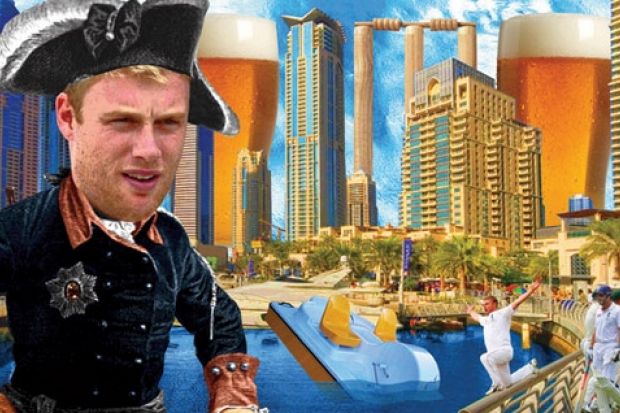Thomas Carlyle wrote that "the history of the world is but the biography of great men". That may not be true, but history would certainly be very dull without them. The same applies to sport. The England team finally wrested the Ashes from the Australians in 2005 after an epic battle, but would the contest have been so thrilling or indeed so memorable had it not been for the heroics of Andrew "Freddie" Flintoff?
"I'm uncomfortable with the word 'great'," said Freddie. "That's for the likes of Botham, Richards and Sobers." Many would disagree with that modest assessment, which shows a greater sensitivity to language than is evident in all those higher education publications that bandy about the word "excellent". Inside Sport (Freddie Flintoff: Ashes Warrior, BBC One, Monday 29 November, 11.05pm) presented a portrait of England's most talismanic cricketer in recent years. Darren Gough, the former Yorkshire and England fast bowler, had only a few words of criticism for his Lancashire rival. "He's the most disorganised person you've ever met, he's the most untidy person you've ever met. I couldn't even get into his car for all the rubbish." Darren himself appeared so alarmingly neat and clean, you could imagine him ironing his ties.
But he had a point. Freddie's aversion to dustpan and brush represents a tendency to chaos that had consequences for his cricket. As captain of the England team during the 2006-07 Ashes series in Australia, he received several warnings for binge drinking, a hobby that got him into more trouble at the 2007 World Cup - where he had to be rescued from a pedalo, an incident that resulted in him being fined and stripped of the vice-captaincy. Ian Botham, himself not averse to the odd pint, passed off such behaviour by saying that it was an aspect of a great talent. He was probably right. It is foolish to expect restraint from men who break records.
Former England captain Michael Vaughan and his trainer David "Rooster" Roberts seemed to understand Freddie best. He needed a lot of nurturing and had to be set definite goals if he wasn't going to spiral out of control. So how was he managing now that injury had forced him into premature retirement? The jury is still out. Freddie and his family now live in Dubai, but the film was coy on how he spent his time. Driving around golf courses and being photographed with tourists, by the look of it. Dubai is full of tall buildings. Freddie finds it hard to cope with heights. He fainted at the top of Blackpool Tower. A bit strange for a man who reached the very top of his profession, wouldn't you say?
It may be even stranger to compare Freddie with Frederick the Great, the subject of a film by Christopher Clark (Frederick the Great and the Enigma of Prussia, BBC Four, Thursday 2 December, 7.30pm). But they share more than a similar Christian name. Both men were daunting warriors. Freddie subdued the Australians, Frederick quelled Austria, France and Sweden to lay the foundations of the Prussian state. And both men juggle two very different selves. There's Andrew and there's Freddie, Flintoff explained. Andrew is a home-loving man while Freddie likes to smash down the stumps, belt the ball over the boundary and bask in the adulation of his fans.
Frederick was not just a brilliant military tactician, he was also a man of culture. He wrote a treatise on kingship, conversed with Voltaire and composed flute concertos. He was an enlightened ruler too, abolishing torture, promoting religious tolerance and establishing a proper legal code. Much of what Frederick achieved would probably be lost on Freddie, whose idea of culture is a night out with James Corden, that self-appointed patron saint of dumb blokeishness. And Frederick differs from Freddie in one other respect - he was a very self-effacing man. This was mostly due to his father, Frederick William I, who not only suppressed his son's artistic leanings but forced him to witness the execution of his best friend who had helped the Prince try to escape from an arranged marriage to an Austrian princess.
Christopher concluded with a cautionary tale. The Nazis appropriated Frederick for propaganda purposes. And so we must always be vigilant to prevent the past from being misused. Which is going to be very hard if the humanities disappear.
Do we still need heroes? Yes. If only Superman could hurl the coalition government into outer space. As that's unlikely to happen, let's take inspiration from George Eliot's observation that "the growing good of the world is partly dependent on unhistoric acts; and that things are not so ill with you and me as they might have been, is half owing to the number who lived faithfully a hidden life, and rest in unvisited tombs".
Register to continue
Why register?
- Registration is free and only takes a moment
- Once registered, you can read 3 articles a month
- Sign up for our newsletter
Subscribe
Or subscribe for unlimited access to:
- Unlimited access to news, views, insights & reviews
- Digital editions
- Digital access to THE’s university and college rankings analysis
Already registered or a current subscriber? Login
